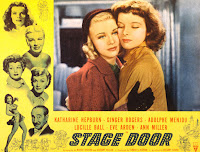(1937)
Directed by Gregory La Cava
Written by Morrie Ryskind and Anthony Veiller, from a play by George M. Kaufman and Edna Ferber
Starring Katherine Hepburn, Ginger Rogers, Adolphe Menjou, Gail Patrick, Andrea Leeds, Lucille Ball, Franklin Pangborn, Grady Sutton, Jack Carson, Ann Miller
IMDB Entry
Though she is rightfully regarded as one of the great of the classic film era, Katherine Hepburn’s career was not a simple path. In the late 30s, she made a series of flops and disappointments, which led Hollywood to label her as box office poison.* But these are not all bad movies, and Stage Door shows her at her best.
The movie shows the lives of a group of aspiring actresses living in a theatrical boarding house in New York and hoping for their big break. The residents include Jean Maitland (Ginger Rogers), a wisecracking and cynical dancer: Linda Shaw (Gail Patrick), who is working because of her relationship with the theatrical producer Anthony Powell (Adolphe Menjou): and Kay Hamilton (Andrea Leeds), who has tasted success, but now is struggling.
Into this group, comes Terry Randall (Katherine Hepburn), who clearly comes from wealth, and who is strong and unflappable. Rooming with Jean, she wisecracks right back, but the people in the house don’t warm to her.
The plot involves auditions, wisecracks and melodrama, all portrayed by some very talented actors. This is one of the few times that Lucille Ball was actually given something comic to do during the 30s, and she’s wonderful. Eve Arden also has a nice presence as Eve, who wanders around the living room of the boarding house with a cat hanging around her neck. There’s also Ann Miller** and character actors Franklin Pangborn, Grady Sutton, and Jack Carson.
The film is based upon a play by George S. Kaufman, and the script had major alterations. Part of it was probably because Terry on stage did not fit with the image of Hepburn. In addition, the script included ad libs and business taken from the interactions of the actresses when they were not being filmed.
The film was a moderate success, but some even said it would have been a bigger one if Hepburn wasn’t in it.
verall, an entertaining and, though melodramatic in part, a reasonable portrayal of the life of actresses starting out.
_________________________________________________________
*Ironically, she was labeled this after making Bringing Up Babe, now considered one of the best screwball comedies ever. Hepburn’s independent attitude also didn’t help in the era of the studio system.
**One of the delights of the film is realizing that there is a dance number featuring two of Fred Astaire’s dancing together. Alas, La Cava shoots the scene without showing their feet!
